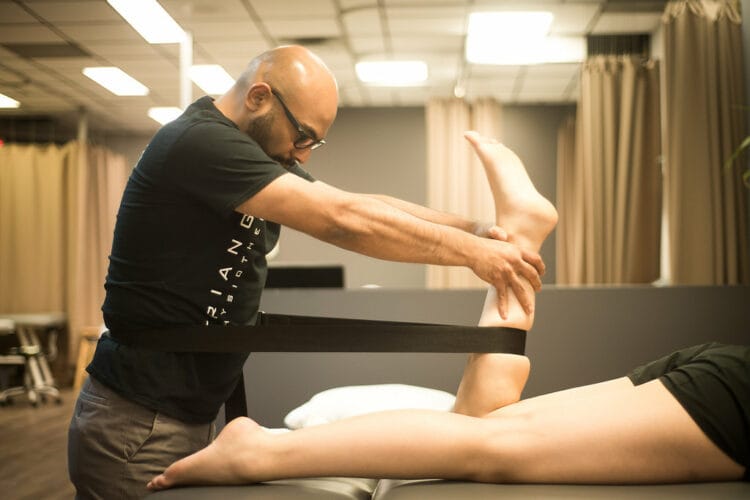When you’re dealing with pain, injury, or chronic conditions like arthritis, choosing the right physiotherapist can make all the difference in your recovery. Physiotherapy is an essential part of managing pain, improving mobility, and enhancing your quality of life. However, with so many options out there, how do you know which physiotherapist is the best fit for your needs? At Triangle Physiotherapy in Toronto we have physiotherapists with varying specialties – from musculoskeletal to pelvic health to kid’s rehab.
In this blog, we’ll explore key factors to consider when selecting a physiotherapist.
1. Specialization Matters
Physiotherapy is a broad field, and different physiotherapists specialize in different areas. Whether you’re recovering from surgery, managing arthritis, or dealing with a sports injury, finding a physiotherapist who specializes in your specific condition can speed up your recovery and improve outcomes.
- For Arthritis and Joint Pain: Look for a physiotherapist with experience in managing musculoskeletal conditions like osteoarthritis or rheumatoid arthritis. They will be skilled in using therapeutic exercises, manual therapy, and pain management techniques to help reduce stiffness and improve mobility.
- For Sports Injuries: If you’re recovering from a sports-related injury, you might want a physiotherapist with experience in sports rehabilitation. They can tailor exercises that enhance strength and flexibility, preventing future injuries.


2. Physiotherapist Credentials and Experience
Check for credentials, such as a degree in physiotherapy (e.g., DPT or MSc in Physiotherapy) and any additional certifications related to your condition (e.g., orthopedic manual therapy or pelvic floor rehabilitation). More importantly, consider their experience: a physiotherapist with years of hands-on experience will likely be more adept at handling complex cases.
- Ask about their track record: How many patients have they treated with conditions like yours? Do they have experience working with people of your age group or fitness level?
3. Personalized Approach
Physiotherapy isn’t a one-size-fits-all treatment. It’s essential to find a physiotherapist who tailors treatment plans to your unique needs, rather than offering a generic approach. A skilled physiotherapist will conduct a thorough assessment of your physical condition, history, and goals before recommending treatment. This personalized approach ensures that you’re getting the care you need.
- Look for a physiotherapist who listens: A good physiotherapist will ask about your symptoms, lifestyle, and preferences to develop a treatment plan that works for you. They should be willing to adjust the plan if something isn’t helping or if new issues arise.
4. Approach to Communication
Effective communication is key to a successful physiotherapy experience. You’ll need to feel comfortable discussing your symptoms, goals, and progress with your physiotherapist. Clear communication helps ensure you understand your treatment plan and feel empowered to follow it.
- Ask about the treatment philosophy: Some physiotherapists emphasize hands-on techniques like manual therapy, while others focus on exercise-based rehabilitation. Ensure that the therapist’s methods align with your preferences and comfort levels.
- Check their availability: Some physiotherapists may be available for short, frequent sessions, while others may offer longer, less frequent appointments. Be sure that their schedule works with yours and that they are accessible for follow-up questions.
5. Physiotherapist Reputation and Reviews
One of the best ways to evaluate a physiotherapist is by asking for recommendations or reading online reviews. Hearing from others who have experienced similar conditions can give you insight into the therapist’s expertise and the quality of care they provide.
- Ask for recommendations: Your doctor, friends, or family members may have personal experiences to share. Word-of-mouth can often lead to finding a trusted physiotherapist.
- Online reviews: Patient reviews can provide valuable insights into a physiotherapist’s approach, professionalism, and success in treating various conditions.
6. Location and Accessibility
Convenience is important when committing to regular physiotherapy sessions. Look for a clinic that is easily accessible, whether it’s near your home or workplace. Consider the hours of operation and the availability of appointments that fit your schedule.
- Travel and parking: Make sure the location is convenient, and check whether there are parking facilities or easy access via public transport.
If you’re unsure of the type of physiotherapy you need, contact us at Triangle Physiotherapy. Our committed team is here to support you in reaching your health and wellness goals—whether you’re a seasoned athlete, a casual enthusiast, or embarking on your fitness journey for the first time.
How do I choose the Best Physiotherapist Near Me?

When choosing a physiotherapist, it’s essential to find someone who meets your specific needs and can provide high-quality care. Here are some steps you can take to help you pick the best physiotherapist:
- Ask for recommendations: Ask your friends, family, or colleagues for recommendations. Personal referrals can be valuable as they come from people you trust.
- Research their experience and specialization: Look for a physiotherapist with experience and expertise in treating your specific condition or injury. Physiotherapy covers a broad range of areas, such as sports injuries, post-surgery rehabilitation, back pain, or neurological disorders. Choosing someone who specializes in your area of concern can increase the chances of effective treatment.
- Check credentials and qualifications: Ensure that the physiotherapist you’re considering is licensed and registered to practice in Ontario. You can usually verify their credentials through the College of Physiotherapists of Ontario.
- Read reviews and testimonials: Search online for reviews or testimonials from previous patients. Although individual experiences may vary, reading about others’ experiences can give you an idea of the physiotherapist’s reputation and patient satisfaction.
- Assess communication and rapport: A good physiotherapist should listen and communicate well. They should be able to understand your concerns, explain your condition or treatment plan clearly, and answer any questions you may have. It’s important to feel comfortable and have a good rapport with your physiotherapist to ensure a positive therapeutic relationship.
- Consider practical factors: Take into account the location of the physiotherapy clinic or practice. It’s generally more convenient to choose a clinic that is easily accessible to you, whether it’s close to your home or workplace. Additionally, check their availability and scheduling options to see if they can accommodate your needs.
- Insurance coverage: If you have health insurance, check if the clinic provides direct billing to your insurance. This way you only have to pay a copayment or deductible if required by your plan.
- Initial Assessment: Schedule an initial assessment with the physiotherapist to discuss your condition, treatment options, and their approach. This can give you a sense of their knowledge, professionalism, and whether their treatment philosophy aligns with your goals.
What are the types of specializations that physiotherapists can have?

Physiotherapists have training in assessing, diagnosing, and treating a wide range of physical conditions and injuries. Physiotherapists can specialize in various areas of practice based on their interests, expertise, and advanced training. Some common specializations that our physiotherapists in Toronto have include:
- FCAMPT – The highest level of training in orthopedic manual therapy
- McKenzie Certification
- Cancer Rehab
- Pelvic Health – Assessing and treating pelvic floor conditions in men and women
- Vestibular Rehab & Concussion Therapy
- Running Assessments
- Sports Physiotherapy
These are just a few examples of the specializations within physiotherapy. It’s worth noting that some physiotherapists may have expertise in multiple areas or choose to focus on specific sub-specialties within these broader categories.
Our More Locations
Physiotherapy Etobicoke | Physiotherapy Oakville | Physiotherapy North York | Physiotherapy Toronto | Physiotherapy Lawrence Park | Physiotherapy Mississauga | Physiotherapy Queens Quay | Physiotherapy Mississauga Erin Mills | Physiotherapy Liberty Village
Click HERE to book an appointment with a physiotherapist at one of our eight locations.
- Physiotherapy Etobicoke – Triangle Physiotherapy Etobicoke
- Oakville Physiotherapy Clinic – Triangle Physiotherapy Oakville
- Physiotherapy North York – Triangle Physiotherapy North York
- Mississauga Physiotherapy Clinics – Triangle Physiotherapy Mississauga
- Downtown Physiotherapy Clinics – Triangle Physiotherapy King West
- Uptown Physiotherapy Clinics – Triangle Physiotherapy Lawrence Park
- Physiotherapy Clinic Downtown Toronto – Triangle Physiotherapy Queens Quay
- Physiotherapy Clinics Mississauga – Triangle Physiotherapy Erin Mills
“Choosing the best physiotherapist near you is crucial for effective treatment and recovery. Triangle Physiotherapy offers expert services across the GTA, including Physiotherapy in Etobicoke, Oakville, North York, Toronto, Lawrence Park, Queens Quay, Erin Mills, Mississauga, and Liberty Village. Our experienced team is dedicated to providing personalized care tailored to your needs, helping you achieve your health goals.”
Physiotherapy, also known as physical therapy, is a healthcare profession that focuses on the treatment and prevention of physical disabilities, injuries, and pain through exercise, manual therapy, and other modalities.
Here are the top 10 frequently asked questions and answers about physiotherapy:
What does a physiotherapist do?

A physiotherapist diagnoses and treats a wide range of conditions affecting the musculoskeletal, neurological, and cardiovascular systems. They develop personalized treatment plans that may include exercises, manual therapy, electrotherapy, and other techniques to help patients recover from injuries or manage chronic conditions. Some Physiotherapists also have specialization in pelvic health, vestibular rehab, concussion management, and pediatrics. Physiotherapists are known to be advocates of movement and good health in the community.
What are the benefits of physiotherapy?

Physiotherapy can help improve mobility, strength, and flexibility, reduce pain and inflammation, prevent injury, and improve overall quality of life. It can also help people recover from surgeries or illnesses and manage chronic conditions such as arthritis, back pain, and stroke.
What conditions can physiotherapy treat?

Physiotherapy can treat a variety of conditions, including but not limited to musculoskeletal injuries such as sprains and strains, post-surgery rehabilitation, neurological conditions such as stroke and Parkinson’s disease, respiratory conditions such as asthma and chronic obstructive pulmonary disease (COPD), and chronic pain syndromes such as fibromyalgia. They can also treat pelvic floor dysfunction, incontinence, and other pelvic floor issues. Vertigo (BPPV) is another condition that some physiotherapists are trained in. Check out the detailed list of conditions on our website.
How long does a physiotherapy session last?

The initial assessment with a physiotherapist at our clinic is an hour long. Follow-up sessions are usually 30 minutes but some people may need longer sessions depending on their condition and treatment plan.
How many physiotherapy sessions will I need?

The number of physiotherapy sessions required varies depending on the condition being treated, the severity of the injury, and the patient’s individual needs. Our physiotherapist will work with the patient to develop a personalized treatment plan and will provide an estimate of the number of sessions needed.
Is physiotherapy painful?

Physiotherapy may involve some discomfort during treatment, especially if the patient is recovering from an injury. However, a physiotherapist will work within the patient’s pain threshold and provide techniques to manage any discomfort. The key is to communicate with your physiotherapist during your treatment session so they can adjust their treatment to keep you comfortable.
Do I need a physician’s referral to see a physiotherapist?

Physiotherapy is primary care in Ontario, so we do not need a referral to see you. However, if you will be claiming your treatments through a benefits plan, it would be best to check with your insurance about their referral requirements. If you will be visiting an OHIP clinic, you will most certainly need a physician’s referral to be covered. See OHIP-covered physiotherapy requirements here.
How do I choose a physiotherapist?

When choosing a physiotherapist, consider their qualifications, experience, and area of expertise. It may also be helpful to read online reviews and ask for recommendations from friends and family. Triangle Physiotherapy has 3000+ 5-Star Google reviews between all eight locations. We pride ourselves on the service we provide and our physiotherapists have a learning mindset so they are always learning new skills.
Is physiotherapy covered by insurance?

Most insurance plans cover physiotherapy, but coverage can vary depending on the plan and the specific services provided. It’s important to check with your insurance provider to determine your coverage.
Our More Locations
Physiotherapy Etobicoke | Physiotherapy Oakville | Physiotherapy North York | Physiotherapy Toronto | Physiotherapy Lawrence Park | Physiotherapy Mississauga | Physiotherapy Queens Quay | Physiotherapy Mississauga Erin Mills | Physiotherapy Liberty Village
How do I book an appointment to see a physiotherapist?
Click HERE to book an appointment with a physiotherapist at one of our eight locations.
- Physiotherapy Etobicoke – Triangle Physiotherapy Etobicoke
- Oakville Physiotherapy Clinic – Triangle Physiotherapy Oakville
- Physiotherapy North York – Triangle Physiotherapy North York
- Mississauga Physiotherapy Clinics – Triangle Physiotherapy Mississauga
- Downtown Physiotherapy Clinics – Triangle Physiotherapy King West
- Uptown Physiotherapy Clinics – Triangle Physiotherapy Lawrence Park
- Physiotherapy Clinic Downtown Toronto – Triangle Physiotherapy Queens Quay
- Physiotherapy Clinics Mississauga – Triangle Physiotherapy Erin Mills
“Physiotherapy plays a crucial role in improving mobility, managing pain, and enhancing overall health. Triangle Physiotherapy offers expert services across the GTA, including Physiotherapy in Etobicoke, Oakville, North York, Toronto, Lawrence Park, Queens Quay, Erin Mills, Mississauga, and Liberty Village. Our experienced physiotherapists provide personalized care to help you achieve your physical health goals.”




